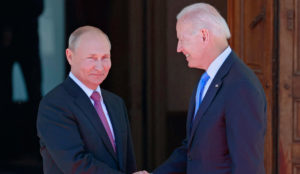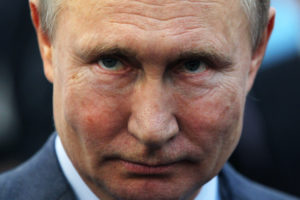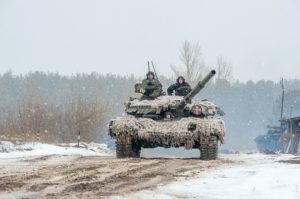Unsurprisingly, the West has decided it won’t send its sons and daughters to die for Ukraine. Instead, it hopes to cripple Russia with economic sanctions. Will such measures bring about the end of the Russian invasion? Will Vladimir Putin scuttle back to the Kremlin with his tail between his legs? It seems unlikely. As the record of international conflict shows, sanctions rarely (if ever) work.
To succeed, sanctions must not only impose economic costs — they must also change the political behaviour of target governments. Neither is at all straightforward.
As the past week has shown, designing sanctions that will harm Russia but not other European economies is fiendishly difficult. So far, only modest measures have been imposed: primarily asset freezes and exclusion from the Swift payments system for some banks; asset seizures and travel bans for some elites and oligarchs; and limits on Aeroflot flights. None of these will cripple Russia’s economy, despite fanciful claims by Western leaders.
The proposed sanctions on Russia’s central bank may cut much deeper. Exactly how far these will go is not yet clear. But freezing Russia’s overseas currency reserves will make it harder for the central bank to defend the value of the rouble, and to supply foreign exchange for commercial banks. This is unlikely to collapse the economy, as some advocates suggest, but it could have significant and far-reaching consequences, including runs on Russian banks and impediments to foreign trade.
However, it’s precisely the threat to trade that will probably lead Western governments to avoid a total freeze — limiting Russia’s access to foreign exchange, but not severing it entirely. The reason is simple: Russia is not a minor economy. Western countries, firms and banks do a lot of business with Russia. Wide-ranging sanctions will naturally have blowback. This is why tougher measures will be difficult, if not impossible, to impose.
The real “nuclear” option would be to embargo Russia’s energy exports, which comprise over half of Russia’s total exports. This would inflict serious damage. But, given that Europe relies on Russia for about a quarter of its oil and over a third of its gas, it would also spur massive inflation and induce economic recession in the West. Prices have already spiked due to the conflict, which will further harm households reeling from record-high energy prices. It’s telling, for example, that Germany has “de-certified” the Nordstream-2 pipeline, but not the pipelines through which it receives existing supplies.
Likewise, Western governments appear unable to agree on completely blocking Russia from Swift, because this would create difficulties for Russian and Western banks alike. Without Swift, how would Germany pay for Russian gas? And, if it cannot pay, would the gas keep flowing? How would the many other Western businesses working in or dealing with Russia make payments? For the same reason, although some sectors of the Russian economy, such as chemicals and automobiles, rely on imported hi-tech Western components, so far, export restrictions remain limited, for fear of damaging Western firms.
Despite their belligerent rhetoric, Western leaders are wary of creating more problems for economies already struggling to recover from the deep recessions caused by their Covid-19 lockdowns. They are quietly carving out even non-critical economic sectors, such as luxury goods and diamond exports, from the sanction regime. It is hard to avoid the impression that, having blundered into confrontation with Russia, Western governments are now realising they have very limited options, and remain reluctant to put their money where their mouths are.
However, even if the West can find ways to inflict serious economic damage on Russia, that still does not mean sanctions will “work”. To be truly effective, they must also change the Russian government’s behaviour. And this is where the logic of sanctions often breaks down. It is remarkably rare for Western policymakers to explain — or even consider — exactly how “economic pain” is supposed to translate into “political gain”. And the prospects in this particular case do not look promising.
The fundamental problem is that sanctions are based on a dubious understanding of human behaviour. They are a quintessentially liberal instrument, resting on the assumption that every man has his price: if I impose economic costs on you, you will revise the cost-benefit analysis of your course of action, and change your behaviour accordingly.
In the real world, however, many regimes and their supporters are willing to endure colossal economic costs to pursue their political and security goals. Saddam Hussein’s Ba’ath Party regime preferred to see Iraq’s economy and society destroyed rather than relinquish power. Fidel Castro’s regime withstood a punishing US embargo for decades. Iran has suffered serious economic harm under Western sanctions without relinquishing its nuclear programme.
What are Putin’s goals in Ukraine? The Russian government has made it clear since the early Noughties that it cannot tolerate the eastward expansion of Nato, considering it a serious threat to Russian security. Its invasion of Georgia in 2008, and its attacks on Ukraine in 2014, long ago demonstrated the Kremlin’s determination to prevent neighbouring countries falling into the Western orbit, even at the cost of international isolation and punitive sanctions. One does not need to sympathise with Putin at all to recognise that Russia’s bank balance is not his primary consideration.
If Putin will not put economic costs ahead of his security goals, how else might sanctions work? Classically, comprehensive embargoes seemed to be guided by a “naïve theory” of sanctions, whereby economic suffering is expected to compel the population to rise up against their wicked leaders. But this rarely, if ever, happens. If anything, economic immiseration tends to fragment and weaken the population, who become absorbed by the struggle to subsist and more reliant on government help — as seen in Iraq.
Targeted sanctions work on an equally naïve basis, assuming that political leaders and their business cronies are completely autonomous from the people, such that manipulating their personal wealth will convince them to change course. In truth, political leaders always represent some broader set of forces in their regime and wider society. Their policies reflect that underlying coalition. If they change course, they will have to answer to their supporters.
Vladimir Putin is a powerful and quasi-authoritarian leader, but he is not autonomous from Russian society. His rise reflects a broadly-based nationalist backlash against the consequences of neoliberal “shock therapy” practised on Russia by the International Monetary Fund after the collapse of the Soviet Union. Under the pro-Western President Yeltsin, the public wealth built up under communism was pillaged by oligarchs, while the Russian people suffered astonishing levels of deprivation. In the decade to 1998, GDP fell by 45%, mortality increased by 50%, government revenues had nearly halved, and crime had doubled.
Putin rose to power by promising to halt and reverse Russia’s national decline. In his first seven years in office, real wages doubled (albeit from a low base). Using soaring oil revenues, Putin stabilised the economy and paid off foreign debt, reasserting Russia’s sovereignty. He brought the oligarchs to heel, jailing or exiling anyone who would not recognise the state’s supremacy. And he restored stability and a measure of national pride to an exhausted and demoralised people. His regime, centred on a network of siloviki (security and military officials) and managers of state-owned enterprises, has proven politically robust and durable — a state within the state.
This is important not to praise or exonerate Putin, but to understand why his popularity has remained high, even under sanctions. Experimental research suggests that Russia’s economic decline since 2014 — mostly caused by declining oil prices, though compounded by sanctions — has cost Putin some support. But it has been more than compensated for by an upsurge in nationalist backing. Putin’s approval rating increased from 65% in January 2014 to 86% in April 2014, following the annexation of Crimea. It remained above 80% for the next two years before returning to the high 60s.
Today, a large majority of Russians blame the West for the crisis in Ukraine, while two-thirds have little or no concern about sanctions. Putin’s regime may have persecuted opposition figures, curbed dissent, and restricted electoral competition — but, despite such authoritarian measures, he retains widespread support. Western leaders could only dream of his approval ratings: support for Biden stands at 42%, for Macron, 40%, and, for Boris Johnson, just 25%.
Nor is there much sign of political fracture within the regime that sanctions could exploit. Putin’s ability to publicly humiliate his spy chief, who bodged his lines at the televised, stage-managed security council meeting prior to Russia’s invasion of Ukraine, suggests he feels secure and confident. The overwhelming vote in the Duma of 400 to zero in favour of recognising the breakaway “republics” of Donetsk and Luhansk suggests either broad elite consensus or an unwillingness to openly defy the Kremlin. Exactly how the (modest) economic pain caused by sanctions is meant to generate political gain is therefore hard to discern.
All too often, sanctions are a comforting but dangerous illusion: they are alluring because they seem to provide an effective option between war and words. When diplomacy seems to fail, and states are unwilling to risk war, something else is needed — and that something is sanctions. But just because something must be done does not mean that this “something” is going to work. Moreover, it is all too easy to forget that embargoes are a weapon of war, often devastating target populations and escalating conflicts, rather than peacefully resolving them. In response to the latest sanctions, Putin has put Russia’s nuclear forces on high alert. It seems unlikely that he would deploy them in response to banking sanctions. But this is a reminder of that the stakes are incredibly high.
Ultimately, even if sanctions do bite, we need to ask: what is the endgame? Sanctions are at best a means to an end, and surely the desired end is lasting peace in Eastern Europe. And one does not need to have any sympathy whatsoever with the Putin regime to believe that this can only be achieved by reckoning with core Russian interests.
Like it or not, powerful states have the capacity to inflict serious harm on weaker ones — just ask the Serbs, Libyans, Afghans, Iraqis and Syrians on the receiving end of the Nato powers’ tender mercies. If Russia is dissatisfied, it clearly has the power to upset the existing order by force. The only way to prevent this is to compromise with Russia’s concerns, or deploy overwhelming force to deter it from using its military power. The West has done neither, dismissing Putin’s demands to establish a neutral buffer zone between Russia and Nato, while failing to deter him from using force to achieve his objectives.
The only way out of this disaster is a negotiated settlement, which will require Nato to reckon with Russian interests, and preserve Ukrainian democracy and sovereignty within a framework of international neutrality. For the brutal reality is this: sanctions are unlikely to force Russia out of Ukraine, and the West is unwilling to be drawn directly into battle with a nuclear-armed state. Unless a diplomatic solution can be found, sanctions are likely to be merely part of a grinding proxy war along the lines of the brutal and horrific conflict in Syria.
The people of Ukraine have already suffered too much. Sanctions won’t save them — they may only make their misery worse.
Disclaimer
Some of the posts we share are controversial and we do not necessarily agree with them in the whole extend. Sometimes we agree with the content or part of it but we do not agree with the narration or language. Nevertheless we find them somehow interesting, valuable and/or informative or we share them, because we strongly believe in freedom of speech, free press and journalism. We strongly encourage you to have a critical approach to all the content, do your own research and analysis to build your own opinion.
We would be glad to have your feedback.
Source: UnHerd Read the original article here: https://unherd.com




